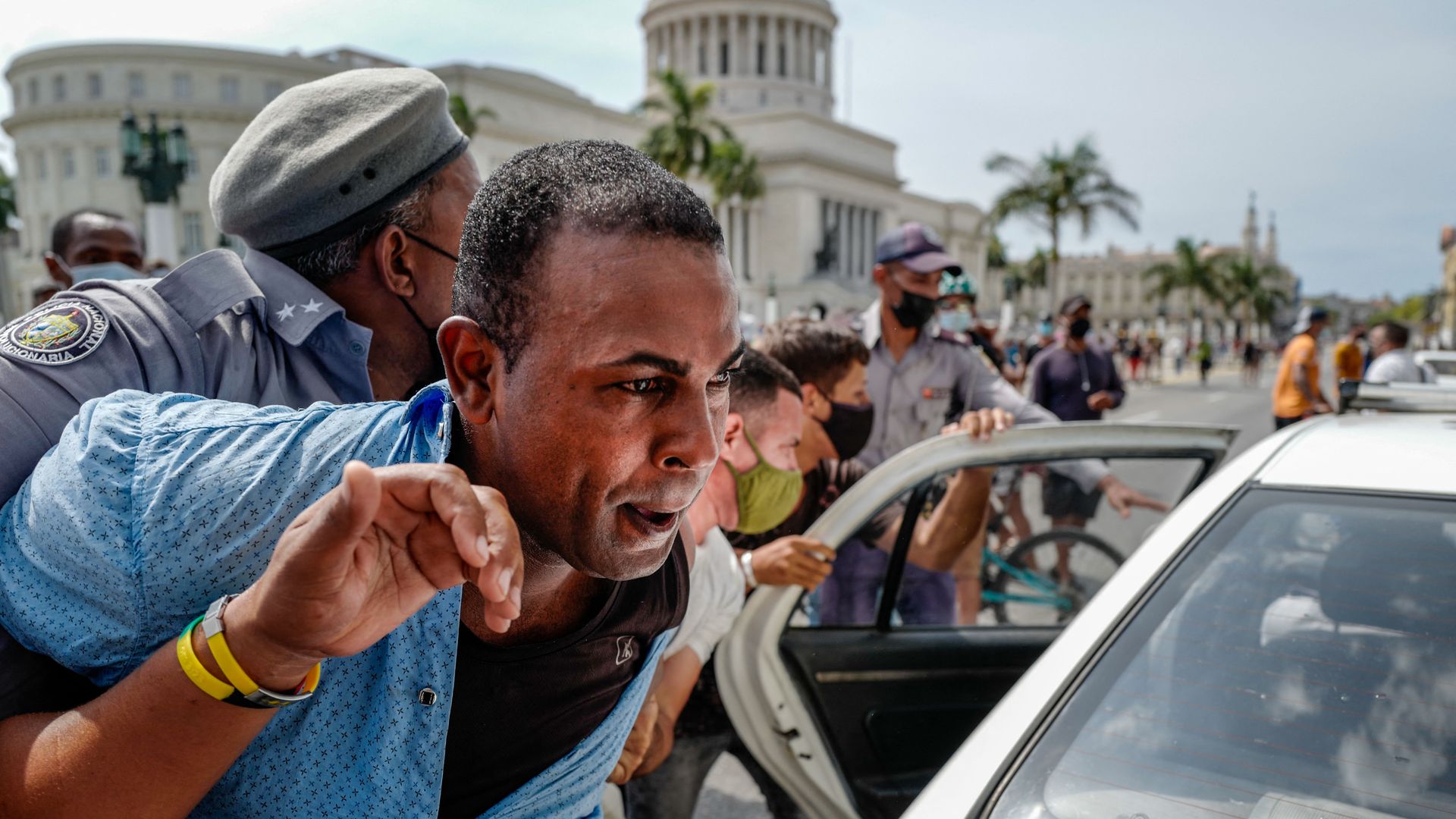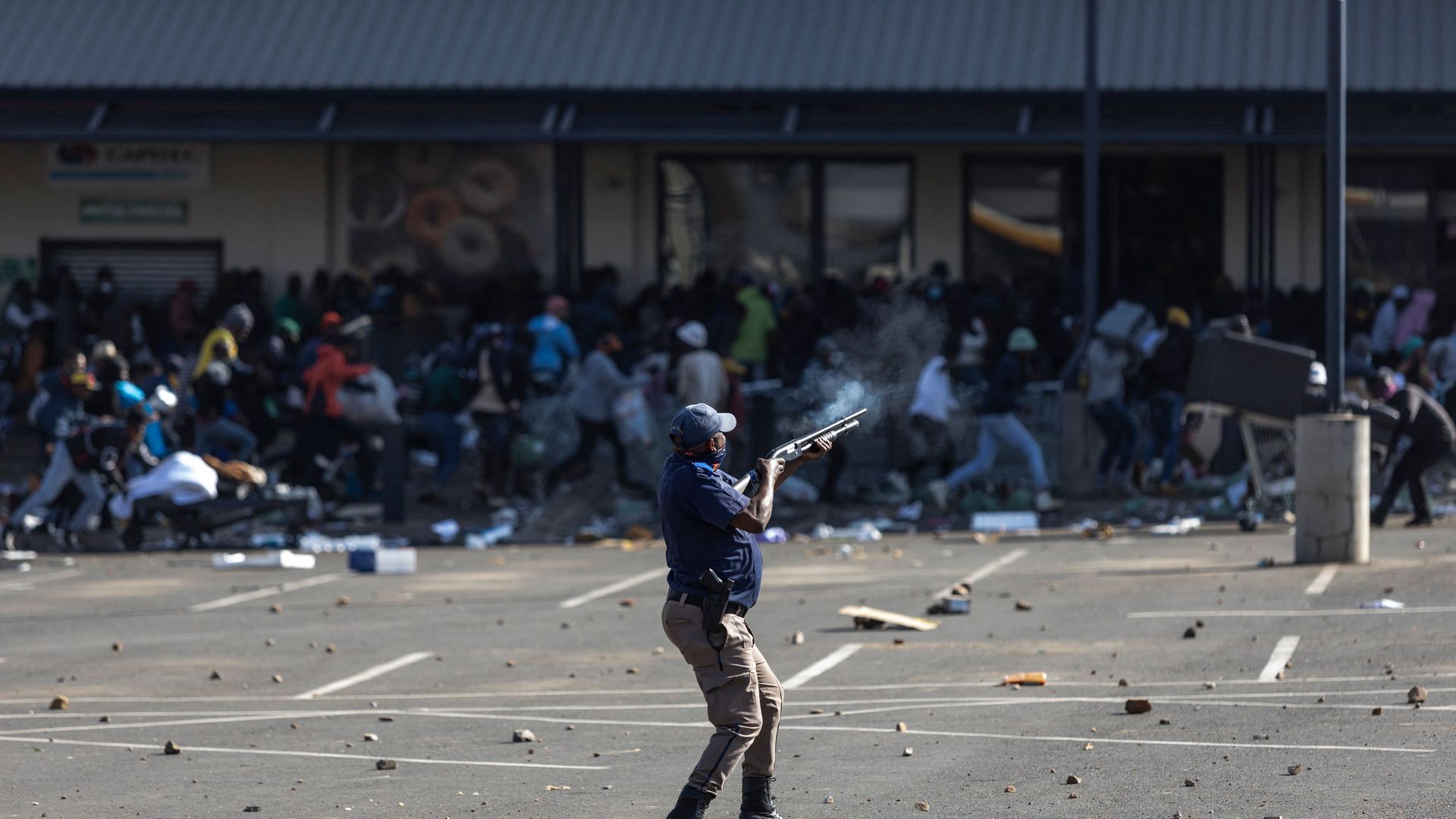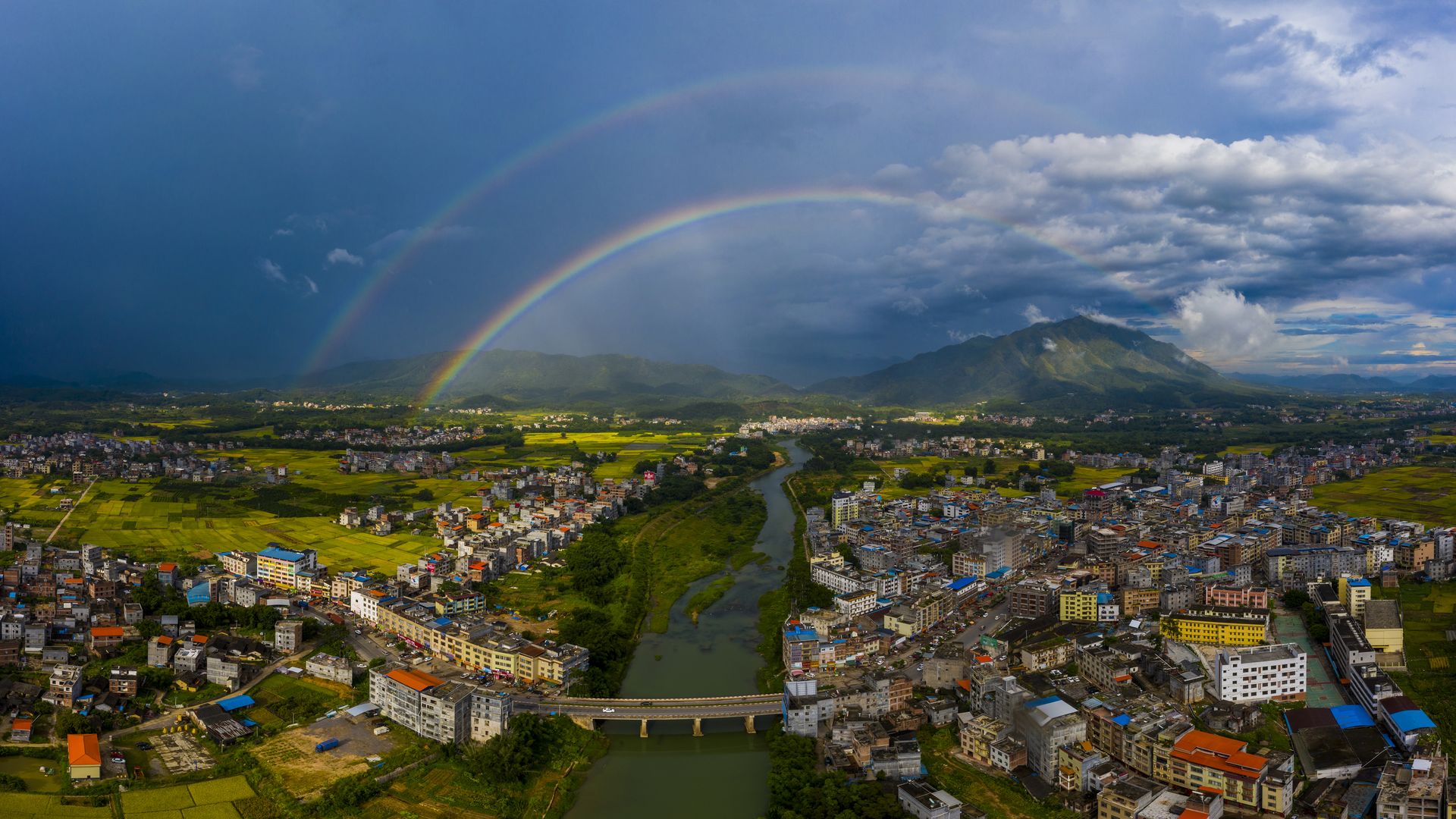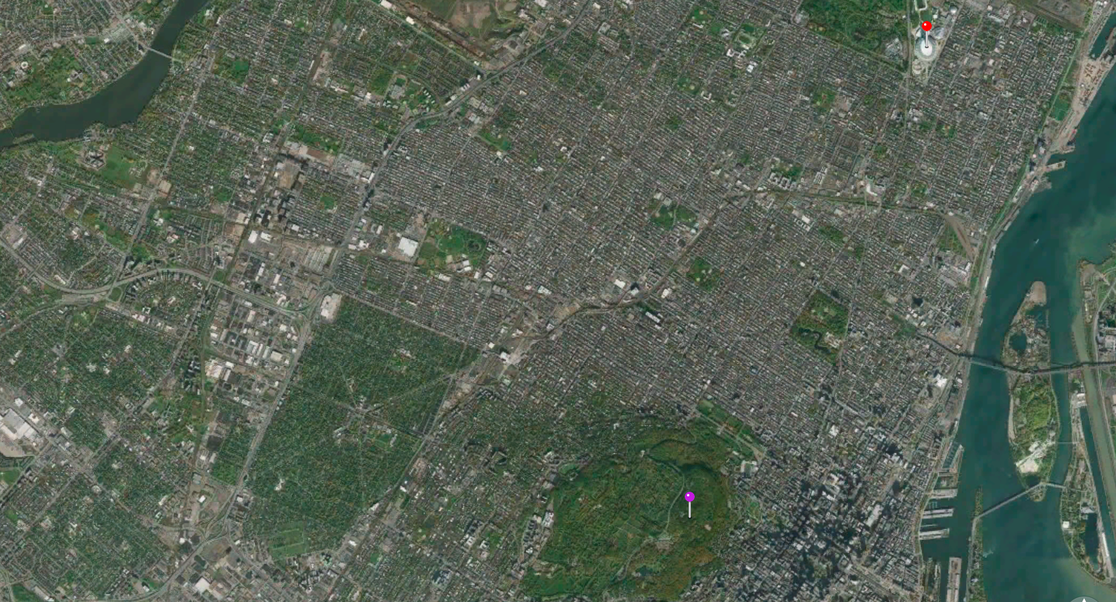| | | | | | | Presented By Babbel | | | | Axios World | | By Dave Lawler ·Jul 12, 2021 | | Welcome back to Axios World. - We're focusing tonight's edition (1,920 words, 7 minutes) on democracy in the Americas, with stops in Brazil, Cuba, Haiti and more.
New arrival? Subscribe. | | | | | | 1 big thing: Bolsonaro fires warning shot for Brazil's democracy |  | | | Bolsonaro and a flashing red light. Photo: Rodrigo Paiva/Getty Images | | | | Under pressure over a deepening vaccine scandal and watching his approval ratings slide to new lows, Brazilian President Jair Bolsonaro is lashing out at his critics and threatening to reject the results of next year's elections. The big picture: Bolsonaro's dismissive approach to the pandemic has long polarized Brazilians, but his base remains loyal and his approval ratings ticked upward last year due to a popular pandemic relief program for poor families. But frustrations have mounted over a slow vaccine rollout that has been further tainted by corruption claims. Driving the news: Brazil's Senate has been holding televised hearings on the government's handling of the pandemic, during which it emerged that Bolsonaro's government ignored repeated offers to purchase vaccines, including from Pfizer. - More explosive still was one witness' claim that despite being warned that a proposed vaccine deal was padded with extra cash for corrupt officials, Bolsonaro turned a blind eye.
- Bolsonaro denies that, but a Supreme Court justice recently approved an investigation into the matter.
State of play: Bolsonaro has faced weeks of street protests, and a Datafolha poll suggests that, for the first time, most Brazilians now support his impeachment, though it's unlikely for now. - Polls also show him trailing his likely rival in the October 2022 presidential election: former president Luiz Inácio Lula da Silva.
- A polarizing figure in his own right, Lula was barred from running in 2018 due to a corruption conviction but cleared to challenge Bolsonaro next year.
- But while some 40% of Brazilians disapprove of Lula, that number recently surpassed 50% for Bolsonaro — making him more unpopular at this point in his presidency than any recent incumbent who sought re-election, says pollster Mauricio Moura, founder of IDEIA Big Data.
Breaking it down: Bolsonaro remains beloved by evangelicals, those nostalgic for military rule, and many in agricultural areas where the economy is booming despite a slump elsewhere in the country, Moura says. - But he has been bleeding support in metropolitan areas amid high inflation and slow vaccinations. Clear evidence of corruption could make that decline irreversible, Moura's polls suggest, but only if he's implicated directly, rather than his sons or close associates.
The flipside: "Bolsonaro is facing an uphill battle, but it remains far too early to rule him out of contention," Gustavo Ribeiro, founder of the Brazilian Report, emails from São Paulo. - "More than anything, presidents in Brazil are judged based on the economy," Ribeiro adds. He reports that government officials believe an economic growth rate of 4–5% this year and 3% next year would be enough to secure re-election.
- "Vaccination is progressing in Brazil, and while that is not thanks to Bolsonaro, he could reap the benefits," Ribeiro continues, noting that Bolsonaro is also planning to extend the popular cash transfer program.
What to watch: A matchup between Bolsonaro and Lula would bitterly divide the country. - That makes Bolsonaro's efforts to sow doubt about Brazil's electoral system — particularly his threats last week to cancel or reject the results of the election unless paper ballots are used — all the more dangerous, Moura says.
|     | | | | | | 2. Democracy in the Americas: Troubling trends |  | | | A billboard for Daniel Ortega in Managua. Photo: Getty | | | | Bolsonaro's warnings echo Donald Trump and past Latin American leaders, but they're already playing out in Peru. Driving the news: Right-wing candidate Keiko Fujimori has filed a flurry of legal challenges to stop her socialist opponent Pedro Castillo from being declared the winner of last month's vote. - Castillo won by just 44,263 votes, and Fujimori is insisting without evidence that at least 200,000 Castillo votes were fraudulent.
- Many of Fujimori's supporters have rallied behind her "stop the steal" effort, making this a particularly combustible situation in a country with fragile democratic institutions.
Nicaragua's democracy has been deteriorating for some time, but the dictatorial trajectory of the Central American country is now more overt than ever. - President Daniel Ortega's regime has been rounding up critics of all stripes ahead of elections in November, many of them on treason charges.
- Some fear El Salvador could be heading in the same direction. Nayib Bukele, the populist president, has already marched troops into Congress to pressure lawmakers and orchestrated the firing of top judges. After a landslide election victory in February's legislative elections, he could push further still.
- The democratic trends aren't encouraging in neighboring Guatemala and Honduras either.
The big picture: Democracy and authoritarianism have tended to come in waves in Latin America, and it's clear what direction the tide is heading in at the moment. - The most recent Latinobarómetro survey, from 2018, found that almost half of all Latin Americans are unsatisfied with democracy in their countries.
What to watch: Global democracy has been in decline for 15 consecutive years according to Freedom House, and President Biden has made reversing that trend a top foreign policy objective. There is plenty to keep him busy in the Americas. |     | | | | | | 3. Democracy in the Americas II: Cubans' "freedom" cries resound in D.C. |  | | | Protesters are arrested in Havana. Photo: Adalberto Roque/AFP via Getty | | | | In Cuba, the largest anti-government protests in decades erupted over the weekend, with protesters chanting for "freedom" in an almost unthinkable display of dissent on an island that has been under Communist control for six decades. State of play: After months of putting U.S. policy toward Cuba on the back burner, events on the island, congressional backlash and political pressure from the South Florida Cuban community are pushing the White House to take action, Axios' Alayna Treene and Sarah Mucha report. - We've seen U.S. policy toward Cuba seesaw back and forth between administrations, and Biden has yet to formulate a clear strategy on how he plans to engage after four years of ultra-hardline policies under Donald Trump.
- Detente with Cuba was a signature policy from Barack Obama's second term, and Biden signaled on the campaign trail that he would resume it, but Biden's statement this morning backing the protesters was his first on Cuba as president.
- Biden's performance in South Florida in 2020 is a key factor — he was crushed by Donald Trump among Cuban Americans. Democrats are aware that mishandling the situation politically could hurt them in the midterm elections.
The other side: The protests are an opportunity for Republicans like Sen. Marco Rubio (R-Fla.) to take a swing at the president for alleged inaction and advocate a hawkish approach to Havana. - But some ex-Obama folks, like former deputy national security adviser Ben Rhodes, have been pressing Biden to return to the Obama-era policies of greater diplomatic and economic engagement with the island.
Go deeper: The protests, in photos |     | | | | | | A message from Babbel | | Here's a skill you can show off this summer | | |  | | | | Travel, friends, adventures – it's happening. What you're missing: Get ready with Babbel and start having conversations in a new language in as little as 3 weeks. Sign up today and get 55% off one of 14 languages including Spanish, French, and German. | | | | | | Bonus: Where in the World? | | Screengrab via Apple Maps We're continuing the Olympics theme and traveling to another host city, with stops at the Olympic stadium (red pin) and on the hill that lends the city its name (purple pin) and is also one of the lovelier urban parks you'll find. - 28 African countries boycotted these games over the participation of New Zealand, whose national rugby team had toured apartheid South Africa in violation of an international sporting boycott.
- The Soviet Union led the medal table, followed by East Germany and the U.S.
- Romanian gymnast Nadia Comăneci was the breakout star.
Can you name the year and the city? Scroll to the bottom for the answer. |     | | | | | | 4. Democracy in the Americas III: Chaos in Haiti |  | | | Interim Prime Minister Claude Joseph holds a press conference. Photo: Valerie Baeriswyl/AFP via Getty | | | | At least four people have claims to the Haitian presidency in the wake of the assassination of President Jovenel Moïse, underscoring the depth of the country's democratic and political crisis. State of play: Interim Prime Minister Claude Joseph assumed the acting presidency after Moïse's death, but the man who had been slated to succeed him this week — a neurosurgeon named Ariel Henry — also says he's in charge. - The Senate, which currently has no legal mandate, nominated one of its own as president.
- And a supreme court justice named Joseph Mécène Jean-Louis was previously put forward by a faction arguing that Moïse had overstayed his term.
- Meanwhile, Haitian officials say a Florida-based doctor named Christian Emmanuel Sanon helped plan the assassination as part of a scheme to take power.
Worth noting: Multiple alleged participants in the assassination were former U.S. government informants, per CNN. They were hired through a company based in Florida. Great line: "Miami and the Doral enclave have become sort of a Star Wars bar for would-be liberators and for-hire warriors," the Miami Herald reports, citing last year's failed invasion on Venezuela, hatched on "the 12th fairway of the Red Course at the Doral resort." |     | | | | | | 5. Global news roundup |  | | | A police officer fires rubber bullets in Soweto during unrest sparked by the jailing of Jacob Zuma. Photo: Guillem Sartorio/AFP via Getty | | | | 1. A pro-EU reformist party won an emphatic victory in Moldova's parliamentary elections on Sunday, dealing a major blow to the Moscow-friendly opposition. - What they're saying: President Maia Sandu, a former World Bank economist, declared "the end of the reign of thieves in Moldova."
2. The results were less clear in Bulgaria, where an anti-establishment party led by a TV star was running 0.2% ahead of the center-right GERB party of former long-term Prime Minister Boyko Borissov. - Borissov failed to form a government after an inconclusive election in April, which followed massive protests last year over corruption and Borissov's alleged mafia ties. Now the upstart "There is Such a People" party faces the challenge of forming a coalition, Axios fellow Teodora Trifonova writes.
3. Ethiopia's ruling Prosperity Party has been declared the clear winner of last month's flawed election, securing another five-year term for Prime Minister Abiy Ahmed. - Yes, but: Abiy's war in Tigray is going less well. "In the past three weeks, Tigrayan fighters have captured a wide swath of territory; retaken the regional capital, Mekelle; imprisoned at least 6,600 Ethiopian soldiers — and claimed to have killed about three times as many," the NYT's Declan Walsh reports in a dramatic dispatch.
4. South African soldiers have been deployed to help police quell civil unrest over the jailing of former President Jacob Zuma. Six people have died 5. A cameraman beaten by far-right thugs while covering a counter-protest against an LGBTQ pride march in Georgia has died. The march was canceled due to threats, and the government and the Orthodox Church have been accused of complicity by joining the opposition. |     | | | | | | 6. What I'm watching: A lot of soccer |  | | | Celebrating in Rome. Photo: Antonio Masiello/Getty Images | | | | Like many of you, I was glued to the TV on Sunday as Italy battled England for the title of champions of Europe. - My loyalties were with England (I lived there briefly), which made it particularly painful to watch the country's dream of ending a 55-year title drought evaporate as 19-year-old Bukayo Saka missed the decisive penalty kick (1-1; 3-2 on penalties).
- The Italians were worthy champions and the country deserved a victory after a difficult 18 months. And what a sensational game it was.
Speaking of worthy champions, Argentina's magnificent Lionel Messi filled one of the few remaining holes on his resume by leading his country to the Copa America title on Saturday against Brazil (1-0). We're heading into a brief off-season lull, but there's one more intriguing game coming next weekend in the African Champions League final, which determines the continent's club champion. - The competition has historically been dominated by North African teams, and in particular by the giants from Cairo, Al Ahly.
- Al Ahly has won the tournament nine times compared to two for all Southern African clubs combined.
- They'll take on South Africa's Kaizer Chiefs, who will be playing in their first-ever final.
|     | | | | | | 7. Stories we're watching |  | | | A double rainbow in Wuzhou, China. Photo: VCG via Getty | | | - Israel becomes first country to offer vaccine booster
- UN extends aid to Syria, ending U.S.-Russia conflict
- Xi and Kim vow closer ties, citing "hostile" foreign forces
- G20 leaders back global tax deal
- LA mayor to be ambassador to India
- 50 dead in Bangladesh factory fire
- China removes giant pandas from endangered species list
Quoted: "Shame on you and I hope you'll crawl back under the rock from which you emerged." — U.K. Prime Minister Boris Johnson, addressing England fans who racially abused three black players who missed crucial penalty kicks. |     | | | | | | A message from Babbel | | Here's a skill you can show off this summer | | |  | | | | Travel, friends, adventures – it's happening. What you're missing: Get ready with Babbel and start having conversations in a new language in as little as 3 weeks. Sign up today and get 55% off one of 14 languages including Spanish, French, and German. | | | | Answer: Montreal, the host city in 1976. |  | | It'll help you deliver employee communications more effectively. | | | | | | Axios thanks our partners for supporting our newsletters. If you're interested in advertising, learn more here.
Sponsorship has no influence on editorial content. Axios, 3100 Clarendon Blvd, Suite 1300, Arlington VA 22201 | | | You received this email because you signed up for newsletters from Axios.
Change your preferences or unsubscribe here. | | | Was this email forwarded to you?
Sign up now to get Axios in your inbox. | | | | Follow Axios on social media:    | | | | | |












No comments:
Post a Comment